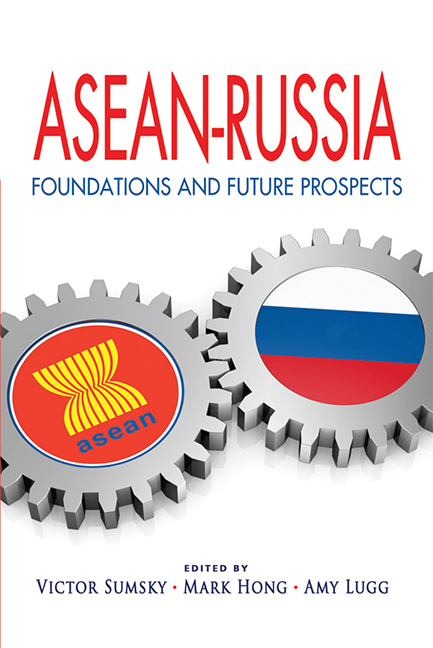Book contents
- Frontmatter
- Contents
- Foreword
- Preface
- About the Contributors
- Keynote Address
- Opening Remarks
- Keynote Address
- Introduction: Russia and the ASEAN Member States: Political and Economic Cooperation in Progress
- SECTION I WISEMEN'S VIEWS
- SECTION II GEOPOLITICS
- SECTION III BILATERAL RELATIONS
- What Singapore May Offer to Russia? The Present State and the Prospects of Relations
- Myanmar-Russia Relations in a Changing World: Growing Ties based on Strategic Partnership and Economic Prospects
- Russian-Myanmar Relations
- Russia-Thailand Relations: Historical Background and Contemporary Developments
- Russia and Vietnam: Building a Strategic Partnership
- Malaysia-Russia Relations: Revving up a Distant Relationship
- Cambodia and the USSR/Russia: Fifty-five Years of Relations
- SECTION IV Business and Economics
- SECTION V CULTURE AND EDUCATION
- EPILOGUE
- Index
Russia and Vietnam: Building a Strategic Partnership
from SECTION III - BILATERAL RELATIONS
Published online by Cambridge University Press: 21 October 2015
- Frontmatter
- Contents
- Foreword
- Preface
- About the Contributors
- Keynote Address
- Opening Remarks
- Keynote Address
- Introduction: Russia and the ASEAN Member States: Political and Economic Cooperation in Progress
- SECTION I WISEMEN'S VIEWS
- SECTION II GEOPOLITICS
- SECTION III BILATERAL RELATIONS
- What Singapore May Offer to Russia? The Present State and the Prospects of Relations
- Myanmar-Russia Relations in a Changing World: Growing Ties based on Strategic Partnership and Economic Prospects
- Russian-Myanmar Relations
- Russia-Thailand Relations: Historical Background and Contemporary Developments
- Russia and Vietnam: Building a Strategic Partnership
- Malaysia-Russia Relations: Revving up a Distant Relationship
- Cambodia and the USSR/Russia: Fifty-five Years of Relations
- SECTION IV Business and Economics
- SECTION V CULTURE AND EDUCATION
- EPILOGUE
- Index
Summary
INTRODUCTION
The reasons behind the dramatic decline in relations between Moscow and Hanoi in the late 1980s and early 1990s are too well known to describe them here in any detail. Even before the fall of the Soviet Union, the donor-recipient relationship that existed earlier between the two socialist states was gone. The strategies of economic reforms adopted in Yeltsin's Russia and under the Vietnam's “Doi Moi” policy could hardly be more different. In the foreign policy realm, Russia mostly aspired for membership in the Western club. Meanwhile, its former Southeast Asian ally had no choice but to adapt to the realities of its regional neighbourhood — a traditionally strong American presence, the rise of China and the Association of Southeast Asian Nations’ (ASEANs’) claim for a bigger role. This combination of factors suggested that with time, the two countries would only be drifting away from each other.
Nevertheless, by the middle of the 1990s there were signs of a somewhat restored mutual interest. If anything, political dialogue was resuming, and high-level contacts were taking place again. In 1994, Russia and Vietnam concluded a Treaty on the Foundations of Friendly Relations. In a very basic sense, they agreed that what they needed in the new geopolitical and geo-economic setting was a reconfiguration, not an abandonment of the old relationship.
This common stand was confirmed in 1998 when President Tran Duc Luong came to Moscow for the first Russia-Vietnam Summit. The intention to develop and diversify bilateral relations was the central theme of the talks. It took two more years to find a solution to a key problem inherited from the past — that of repaying Vietnam's state debt to Russia. In terms of opening ground for a new stage in trade and economic cooperation, this was a major step forward.
REINFORCING POLITICAL AND MILITARY TIES
Intensified political dialogue: Upon arrival in Hanoi in March 2001, President Vladimir Putin — the first head of the Russian state to ever visit Vietnam — received an enthusiastic welcome and, in turn, he expressed readiness to open a new chapter in the history of the relationship.
- Type
- Chapter
- Information
- ASEAN-RussiaFoundations and Future Prospects, pp. 173 - 183Publisher: ISEAS–Yusof Ishak InstitutePrint publication year: 2012



